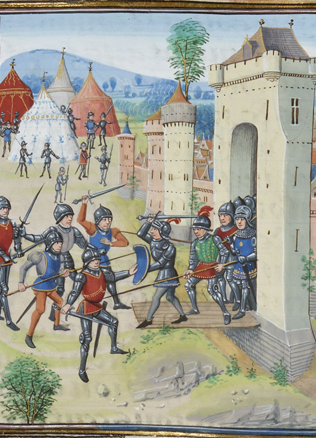Lithuania’s Baptism: Completion of Christian Europe
Having integrated the Greek philosophy, Roman legal thought and Jewish faith into one whole, Christianity laid foundation of civilization, which serve as the basis even for modern democratic institutions of the Western world and human rights. Even though neither democracy nor human rights are perceived by Christianity as ends in themselves, the concept of the human-being advocated by this religion determined the development of the overall Christian and even global civilization. The core of this concept is the philosophy that each individual should be treated as unique and possessing an incomparable value as having been created in the likeness of God and therefore cannot be regarded as part of nature. Such statements might sound abstract, and yet there is an ideal of freedom embedded in them, encouraging the individual to answer for his actions before God and his neighbour and preventing any manipulation of the individual by the powerful of the world. This is regarded as a revolutionary Christian message, which sooner or later became rooted in various countries. Notwithstanding the fact that Christianity is a universal religion, its consolidation in a particular society always resulted in acquiring distinctive forms. This is particularly obvious in the European history of Early Medieval Ages, in which a distinct cultural identity of the Irish and English, Frankish and Germanic, Slavic and Greek Christian cultures can be discerned as early as the 6th-9th centuries. To summarize, the Europe of those days can be fathomed as a Christian archipelago within a narrowing ocean of Paganism and Barbarism.
Formation of Medieval Christianity
The first Christian communities in Western Europe were established in the times of the Roman Empire. At that time, Christianity was still largely a Mediterranean phenomenon. Its leap to the north of the Alps should be related to the decision made by the Frankish King Clovis to convert to the Roman Catholic faith (about 507).
“
Christianity spread and became embedded in the countries which had already existing state structures.
Yet another leap of Christianity occurred in the 9th-10th centuries. A turbulent expansion of Christianity was taking place in various forms, such as waging wars, conducting peaceful missions and implementing voluntary decisions made by rulers of newly emerging states to adopt Christian faith. A military expansion of Christianity is mainly associated with Charlemagne’s wars waged against pagan Germanic tribes. The mission carried out by the saint brothers Cyril and Methodius in Central Europe symbolized a peaceful dissemination of Christianity (about 864), whereas the Czech Republic, Poland and Hungary became the best examples of the new Christian states (10th century). These countries contributed to the formation of Central European region. At the same time, the image of the East European region started to be created. Its core consisted of Kiev Rus’, which adopted the Christian faith according to the Greek Rite (988). Christianity spread and became embedded in the countries which had already existing state structures. However, there were also countries in Europe, the societies of which were more scattered and decentralized. They remained pagan. Contemporary Christian authors described them as intolerant of the government in which power was vested in a King. Such societies were represented by the Slavic tribes, occupying the southern coast of the Baltic, as well as the Baltic and Finno-Ugric peoples, living in the Eastern Baltic territory.
Phenomenon of a Pagan State
Considering the historical circumstances, the spread of Christianity and the establishment as well as development of statehood should be regarded as related processes. The same historical pattern applies to Lithuanian history as well. The first ruler of Lithuania Mindaugas became the first and only Christian King of the old Lithuania. The predominant stream of Christian political thought of those days recognized the legitimacy of pagan power. Among the most prominent representatives of this political thought was Pope Innocent IV, known for his excellent educational background in canon law.
“
Following these events, a strongly militarized political culture settled in Lithuania; unlike the situation in other Christian countries, there were no bishops, abbots or chaplains standing on either side of the King to mitigate the manifestations of this culture.
In 1251, Pope Innocent IV recognized Mindaugas’ baptism and the state ruled by him. In 1253 the same Pope made proper arrangement to have Mindaugas crowned as King of Lithuania. It was presumed that the interfaces of Lithuanian statehood and adoption of Baptism would result in a similar development of the state as experienced by Poland or Hungary. However, Mindaugas’ murder and the subsequent turmoil which arose afterwards as well as restoration of the monarch’s power under Traidenis revealed yet another truth, namely that even a non-Christian state could exist as well. Following these events, a strongly militarized political culture settled in Lithuania; unlike the situation in other Christian countries, there were no bishops, abbots or chaplains standing on either side of the King to mitigate the manifestations of this culture.
Vanguard of civilization with the sign of the cross
In the Late Medieval Ages, the progress of civilization was closely related to Christianity. The culture of script, urban civilization and all the accomplishments of this civilization were first and foremost thriving among Christians. This is proof that Christians were still needed to generate these primary impulses. All of this is reflected in Vilnius becoming a city at the start of the 14th century. Vytenis and Gediminas intentionally invited German colonists to settle in Vilnius; furthermore, they provided favourable accommodation conditions for Ruthenian merchants and craftsmen, thus motivating them to settle in Vilnius as well. Such a diverse neighbourhood provided favourable conditions for pagan Lithuanians to learn the skills of productive crafts. The pursuit of the benefits provided by civilization is obvious in Gediminas’ letters, in which economic aspects are closely related to vague promises made by the Lithuanian Ruler to adopt Christian faith. Vague as those promises were, they still gave hope to Christians. It was Lithuania’s geopolitical involvement in the expanses of Orthodox Rus rather than attachment to their ancestors’ faith that prevented Lithuanians from adopting Christian faith under the rule of Gediminas or Algirdas and Kęstutis.
“
The pursuit of the benefits provided by civilization is obvious in Gediminas’ letters, in which economic aspects are closely related to vague promises made by the Lithuanian Ruler to adopt Christian faith. Vague as those promises were, they still gave hope to Christians.
Do You know?
The policy led by Grand Dukes of Lithuania Vytenis and Gediminas at the start of the 14th century reflects a pursuit of civilizational accomplishments achieved in the West, which in the later Medieval period were closely related to Christianity. It was Lithuania’s geopolitical involvement in the expanses of orthodox Rus rather than attachment to their ancestors’ faith that prevented Lithuanians from adopting the Christian faith under the rule pf Gediminas or Algirdas and Kęstutis. Lithuania’s balancing between the East and the West enabled the country to ‘conserve’ paganism, which otherwise lacked the strength of creative energy, up until the end of the 14th century.
Lithuania’s balancing between the East and the West enabled to ‘conserve’ paganism, which otherwise lacked the strength of creative energy, up until the end of the 14th century. It was only after the representatives of the new generation, advocates of Jagiello and Vytautas, stood at the helm of power that the required political will to adopt Christian faith was finally manifested. Jagiello’s and Vytautas’ contribution to making the Church more numerous earned them the names of apostles. Under their rule, Christian authority and governance started to gradually cover a major part of Europe (a minor part had been subjugated by the Ottoman Empire). In this respect, Lithuania’s Baptism should be regarded as a geopolitical achievement for the whole of Europe.
Darius Baronas
Literatūra: Krikščionybės Lietuvoje istorija, sud. V. Ališauskas, Vilnius: Aidai, 2006.


